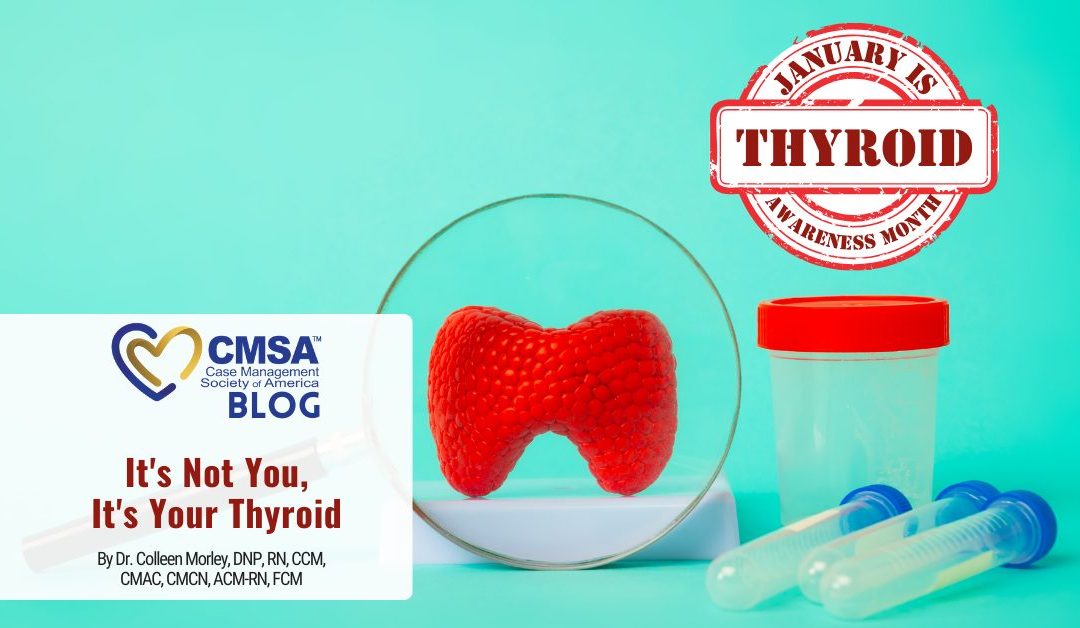By Dr. Colleen Morley, DNP, RN, CCM, CMAC, CMCN, ACM-RN, FCM
Every January, Thyroid Disease Awareness Month provides a crucial platform to shed light on a condition that affects millions of people worldwide. The thyroid gland, a small butterfly-shaped organ in the neck, plays a significant role in regulating various bodily functions. However, when this gland doesn't function as it should, it can lead to a range of health issues.
It’s important to understand the thyroid gland's function. This tiny powerhouse produces hormones that control our metabolism, energy levels, and even body temperature. It's like the body's internal thermostat, maintaining a delicate balance of hormones to keep us feeling our best.
Thyroid disorders encompass a spectrum of conditions, with two of the most prevalent being hypothyroidism and hyperthyroidism:
- Hypothyroidism: In this condition, the thyroid gland doesn't produce enough hormones, leading to symptoms like fatigue, weight gain, and depression.
- Hyperthyroidism: On the opposite end of the spectrum, hyperthyroidism results from an overactive thyroid gland, causing symptoms such as anxiety, rapid weight loss, and heart palpitations.
The Importance of Awareness:
Thyroid diseases often fly under the radar because their symptoms can mimic other health issues. This topic is very important to me as thyroid disease runs rampant in my family. My mother had Graves’ disease and my youngest child was diagnosed with Hashimoto’s disease at the age of 8. This diagnosis was a complete surprise to us, as we had been working through multiple issues for several years. No one thought of Hashimoto’s disease as Hashimoto's disease is about seven times more common in women than in men. It can occur in teens and young women, with the “usual” diagnosis age being between 30-50 years of age. So, here we have an 8-year-old male receiving this diagnosis after years of medical workups. Talk about a surprise!
Managing a thyroid disorder often involves multiple healthcare providers, medications, and treatments. Coping with a chronic condition like a thyroid disorder can be challenging. Case managers can provide valuable information about thyroid diseases, their symptoms, and the importance of regular check-ups. They ensure that patients are well-informed and empowered to take an active role in managing their health. As my son was diagnosed as a pediatric patient, there was the additional challenge of transitioning his management for ongoing lifetime care when he aged out of pediatrics to adulthood; both in providers and his self-management. I leaned into friends who are pediatric case managers for strategies to help him assume oversight of his condition over time. He does very well, but his case manager (me) reminds him about his twice-yearly checkups and helps him navigate the test schedule.
During Thyroid Disease Awareness Month, this is an opportune time to refresh our understanding of the impact this unassuming gland plays, the havoc it can wreak when it’s not working right, and how it can take years to get a diagnosis to start treatment. Together, through education, advocacy, and coordination of care, we can make a difference in the lives of those battling thyroid disorders and promote overall wellness.
CMSA's ICM program provides multiple strategies to engage clients, stratify risk, and develop care plans to mitigate risk and help clients achieve improved health and well-being. Join us to learn these concepts through engaged learning, self-study and interactive sessions with your peers. Through CMSA’s new ICM Training, program elements and training activities have been updated to reflect the new ICM manual. Register Now for the virtual Spring training, April 16 - 18, 2024. Earn 28.5 RN, SW, and CCM credits. Register here: https://cmsapmg.wpenginepowered.com/integrated-case-management/
Bio: Dr. Colleen Morley DNP RN CCM CMAC CMCN ACM-RN FCM is the Associate Chief Clinical Operations Officer, Care Continuum for University of Illinois Health System and the current President of the Case Management Society of America National Board of Directors. She has held positions in acute care as Director of Case Management at several acute care facilities and managed care entities in Illinois, overseeing Utilization Review, Case Management and Social Services for over 14 years; piloting quality improvement initiatives focused on readmission reduction, care coordination through better communication and population health management. Her current passion is in the area of improving health literacy. She is the recipient of the CMSA Foundation Practice Improvement Award (2020) and ANA Illinois Practice Improvement Award (2020) for her work in this area. Dr. Morley also received the AAMCN Managed Care Nurse Leader of the Year in 2010 and the CMSA Fellow of Case Management designation in 2022. Her 1st book, “A Practical Guide to Acute Care Case Management”, published by Blue Bayou Press was released in February, 2022. Dr. Morley has over 20 years of nursing experience. Her clinical specialties include Med/Surg, Oncology and Pediatric Nursing. She received her ADN at South Suburban College in South Holland, IL; BSN at Jacksonville University in Jacksonville, FL, MSN from Norwich University in Northfield, VT and her DNP at Chamberlain College of Nursing.

